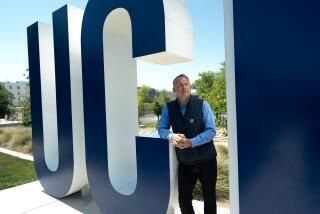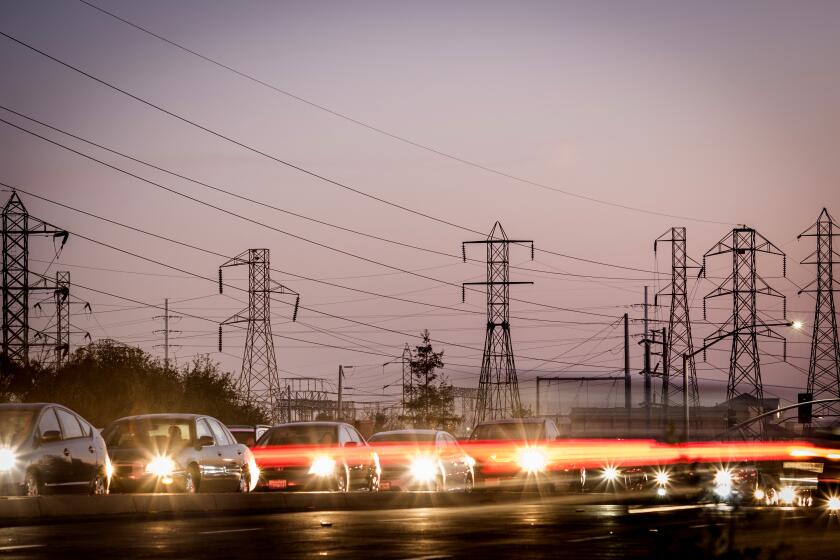Old Can Help Young Escape Poverty : Elderly, Now Better Off, Should Fill Leadership Role
In the last decade the economic position of America’s elderly has improved while the fortunes of its children have fallen. Sen. Daniel Patrick Moynihan (D-N.Y.) recently noted that “the United States has become the first society in history in which a person is more likely to be poor if young rather than old.” It is a dubious distinction.
That the economic condition of our youngest citizens has fallen is indisputable. The official poverty rate for children under age 6 climbed from 15% in 1980 to 21% in 1984. In some categories the numbers are much worse: 51% of young blacks, 40% of Latinos and 65% of children in female-headed households are below the poverty line.
At the same time that poverty among children has soared, inflation-adjusted public spending that benefits them directly has grown modestly, or not at all.
Among the elderly it is a different story. In 1970, 25% lived below the poverty line, compared with 12% in 1984. When the market value of all food, housing and medical benefits is taken into account, less than 3% of the elderly were poor; for children under 6 the comparable figure was 18%.
The virtual elimination of poverty among senior citizens is one of the few clear success stories of the federal government’s War on Poverty. But it goes largely unrecognized. Groups that represent the elderly find themselves forced to argue that further efforts are necessary, lest it appear that reductions in existing programs might be feasible. This was the case when the House Select Committee on Aging gave prominent attention to an interest-group’s report claiming that poverty among the elderly is worse than the statistics suggest, and not as bad for children (thus demonstrating Mark Twain’s adage: “There are lies, damn lies and statistics”).
Thanks to the disparities and the attendant controversy, this issue is becoming politicized. But ultimately it is counterproductive to frame public policy debates as a trade-off between generations. Policy-makers will not take a benefit from one group just to help another, for the first rule of politics is “Do no direct harm.” It may be possible to increase federal spending for poor children, but it will not be done by cutting benefits for the elderly or anyone else.
Despite the folly of raising the issue in such broad terms, it will not go away. The trends are too clear to permit that. And specific events will continue to highlight the controversy. This summer Congress is almost certain to take special action guaranteeing a cost-of-living increase to Social Security recipients. (Inflation is so low that the annual increase is unlikely to be provided automatically.) At about the same time, the Census Bureau will release the poverty statistics for 1985, which will once again show poverty more widespread among children than any other age group.
Reducing poverty among children is not just a question of social justice, it is a matter of economic necessity. Today’s children are tomorrow’s work force and tomorrow’s underwriters of Social Security. If we don’t begin to address their current deprivation, their economic future, and the nation’s, will be sorely limited. In Moynihan’s words, “A commonplace of political rhetoric has it that the quality of a civilization may be measured by how it cares for the elderly. Just as surely, the future of a society may be forecast by how it cares for its young.”
Tackling the epidemic of poverty among children will require political leadership as well as money. Ironically, interest groups that represent the elderly, such as the American Assn. of Retired Persons and the Gray Panthers, are in a unique position to provide the leadership. The improved status of their constituency stands as proof that social-welfare spending can make a positive difference--something that Americans forget too easily.
There is also a matter of self-interest worth noting. By expanding their leadership role on behalf of the young, the elderly can help focus the political agenda. This will ensure that attention is directed at the economic condition of the young, and not on the differences between young and old.
It would be easy for the elderly to dismiss the condition of today’s children with an “I’ve got mine” attitude. But such an attitude is totally inconsistent with the previous contributions that they have made on behalf of the nation’s future. The widespread poverty among children offers a chance for another contribution, one that need not threaten the elderly’s current position as it helps to ensure the nation’s economic future.
More to Read
Get the L.A. Times Politics newsletter
Deeply reported insights into legislation, politics and policy from Sacramento, Washington and beyond. In your inbox three times per week.
You may occasionally receive promotional content from the Los Angeles Times.






